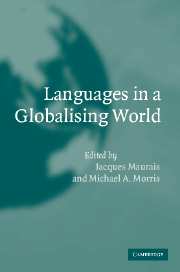Book contents
- Frontmatter
- Contents
- List of figures
- List of tables
- Notes on contributors
- Acknowledgements
- 1 Introduction
- Part I Global communication challenges
- Part II Major areas
- 7 Language geostrategy in eastern and central Europe: Assessment and perspectives
- 8 Languages and supranationality in Europe: The linguistic influence of the European Union
- 9 Regional blocs as a barrier against English hegemony? The language policy of Mercosur in South America
- 10 Effects of North American integration on linguistic diversity
- 11 Sociolinguistic changes in transformed Central Asian societies
- 12 Language and script in Japan and other East Asian countries: Between insularity and technology
- 13 Sub-Saharan Africa
- 14 Australasia and the South Pacific
- Part III Languages of wider communication
- Conclusion
- Index
9 - Regional blocs as a barrier against English hegemony? The language policy of Mercosur in South America
Published online by Cambridge University Press: 18 November 2009
- Frontmatter
- Contents
- List of figures
- List of tables
- Notes on contributors
- Acknowledgements
- 1 Introduction
- Part I Global communication challenges
- Part II Major areas
- 7 Language geostrategy in eastern and central Europe: Assessment and perspectives
- 8 Languages and supranationality in Europe: The linguistic influence of the European Union
- 9 Regional blocs as a barrier against English hegemony? The language policy of Mercosur in South America
- 10 Effects of North American integration on linguistic diversity
- 11 Sociolinguistic changes in transformed Central Asian societies
- 12 Language and script in Japan and other East Asian countries: Between insularity and technology
- 13 Sub-Saharan Africa
- 14 Australasia and the South Pacific
- Part III Languages of wider communication
- Conclusion
- Index
Summary
Latin America and linguistic globalisation
The outlook of geopolitical linguistics is discussed at present at the two poles of the multilingual world continuum. On the one hand, the warning launched by Hale (1992), Krauss (1992) and others regarding the possible death of 90% of the languages of the world by the end of the twenty-first century as a result of linguistic globalisation has strengthened a series of movements and concerns for the most endangered languages. Some of them relate the dangers of a reduction in biodiversity with those involved in linguistic diversity (compare Harmon 1996; Skutnabb-Kangas 2000). In general they are champions of an unlimited defence of all languages of the world, arguing along with Fishman (1991; 2001) and others that the disappearance of any language constitutes an irreparable loss of global linguistic treasures. They particularly defend the fundamental linguistic rights of all citizens of the world to be educated and to have access to other public services in their own language (Skutnabb-Kangas and Phillipson 1994; Skutnabb-Kangas 2000).
At the other end of the continuum we find the debate on the worldwide spread of English: for the first time in the history of humankind one single language has been globalised not only among an international elite, but on a massive basis, posing a threat to many other languages' space. The danger represented by the expansion of English is, however, indirect for the languages at risk of extinction in other latitudes, except for those found in Anglophone countries, due to a general reordering of the complex linguistic mosaic in many countries and regions.
- Type
- Chapter
- Information
- Languages in a Globalising World , pp. 111 - 142Publisher: Cambridge University PressPrint publication year: 2003
- 17
- Cited by



